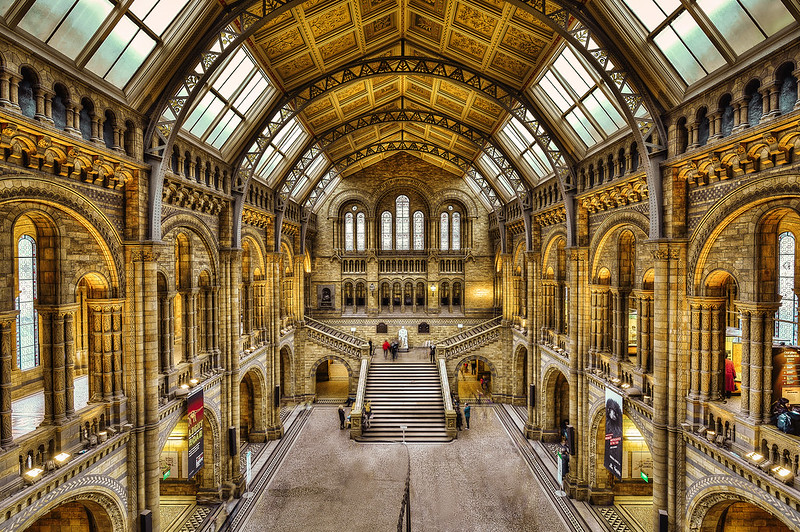Exploring who we are through awe
One of my favourite places in London is the Natural History Museum. I love the exhibitions and the elevation of the natural world, but that’s not why I keep going back. I go for the awe I feel as I step inside. Take a look…

In a quiet corner of this vast atrium is a small, unremarkable notice, which says:
Taking inspiration from the collections it was to house, the building was designed to be richly decorated with a diversity of extinct and extant species. It was to be a cathedral to nature.
A cathedral to nature. It sends a shiver down my spine. This cathedral wasn’t built for the glory of any god, but to inspire awe in the glory of nature.
Awe is one of my favourite emotions. For me it’s stepping into the atrium of the Natural History Museum, looking down at the city of La Paz in Bolivia, or watching Apollo 11 on a big screen. For you it will be something else, but you know what I’m talking about.
As I step into this atrium, for a single expansive moment my brain drops its perceptual filters, I step through a veil and all I can do is stare. Time slows down and my thoughts vanish. I’m no longer just an observer, I’m an integral part of the fabric of existence in front of me. It’s a nourishing, replenishing experience.
I describe a similar experience of walking through a park in London as part of my Zen practice.
Everything inverted as my mind expanded outside my head and the world came rushing in. The idea of any difference between inside and outside made no sense and it was plainly obvious that any notion that ‘I’ exist separately of ‘all that’ was a ludicrous illusion.
That these two experiences can be described in such similar language points to something interesting. Both come from a special kind of present-focused attention, both involve a feeling of oneness with the world and both occur spontaneously. I’m sure we all know that feeling when something catches us by surprise and – BANG! We “turn off the conditioning and experience afresh the hardly bearable ecstasy of direct energy exploding on our nerve endings” 1.
How we use our attention is the common factor. Charles Darwin said “Attention, if sudden and close, graduates into surprise; and this into astonishment; and this into stupefied amazement” 2. Those moments of awe, where we feel fully absorbed in the moment, must contain within them something so worthwhile as to capture our attention fully and temporarily switch off our thinking minds.
This points to something tangible that we can use in our day to day lives: the conditions under which we experience awe contain valuable information. We can use awe to explore our inner worlds and understand who we are and what matters to us.
One of the techniques I learned as part of my coaching training is to identify a client’s guiding values by exploring their peak experiences, those moments of complete absorption that make the client come to life. Most people have only a vague sense of their values, so one role of the coach is to help identify them and bring them into conscious awareness.
As a client describes a peak experience, I might interject with “it sounds like you really value x?”, to which the client might respond with “yes, you’re right!”. Their tone is almost always a kind of familiar surprise. I don’t tell them anything they didn’t already know at some level, but aim to give them greater awareness of and access to their own inner wisdom.
Here’s what I’ve learned from exploring my own sense of awe. I feel it most frequently when my attention is captured by nature or by some impressive expression of human civilisation. This tells me that these things are connected to each other and I to them. Carl Sagan captured this connection when he said “the cosmos is also within us, we’re made of star-stuff. We are a way for the cosmos to know itself.” 3 This has become one of my personal axioms.
We are not separate from the universe, we are it. As we learn, understand and experience more of the universe, the universe learns, understands and experiences more of itself. This perspective is partly why I find human experience so interesting and why feeling awe in the Natural History Museum is so powerful. As a cathedral to nature it’s a cathedral to the universe.
In a brief moment of awe – as the walls between the isolated ‘me in my head’ and the ‘universe out there’ come crashing down – it’s all just one thing. I am that. And in that moment the universe is awestruck by its own majesty, seen through my eyes.
That perspective moves me. It guides my belief that advancing human progress across vast timescales is worthwhile. It means we should seek to grow through existential threats like climate change. It means we should one day explore beyond our solar system. And it means we should be curious about the nature of our own subjective awareness. Our continued growth is after all how the universe will get to know itself even better.
So I invite you to reflect on those moments when you feel awe. What connects them? What do they say about what matters to you? And what might happen if you share them with others?
And not referenced directly, but Jason Silva’s video ‘Awe’ has been a huge inspiration for this article and for my appreciation of awe more generally.